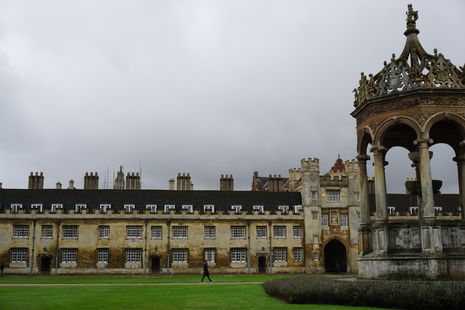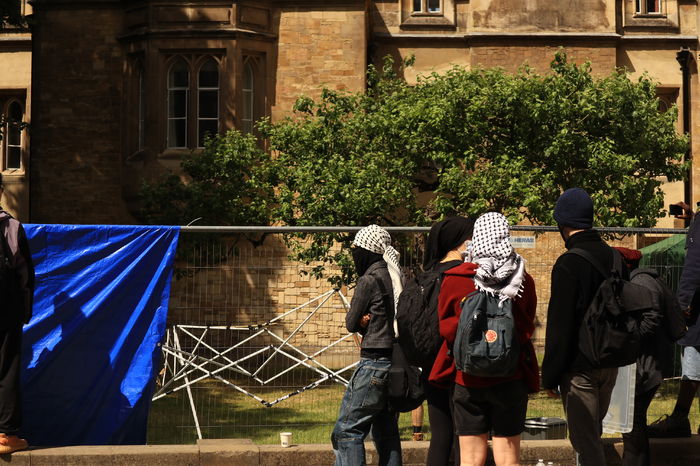Trinity stalls on divestment review despite mounting pressure
The College Council will only ‘decide on what, if any, change to make’ once the University’s arms review is concluded

Trinity College has reaffirmed its arms investment policy, stalling on a comprehensive review, despite growing calls to divest from its student body and the pro-Palestine encampment.
In an email sent to students on Thursday (05/06), Senior Tutor Catherine Barnard responded to “a number of questions” about arms investments raised at a liaison meeting between College Council and student representatives the day before.
Barnard stated: “Last year the College Council received letters from students and fellows on its arms investment policy. Council took advice from the Investment Committee on the financial impact of amending its existing arms investment policy and adding further exclusions. As a result of that report it became clear to Council that this was primarily a policy issue, not a financial one.
“Council therefore decided to wait for the report from the University’s arms investments review (which is also looking at the research impact of investment decisions) and to see the University response,” she continued. A meeting of fellows is scheduled for the end of [Easter] term, but the timeline for the University’s report, which was delayed in Michaelmas, remains unclear.
“Once both have occurred,” Barnard wrote, “Council will decide on what, if any, change to make to Trinity’s present policy”. In the meantime, the Senior Bursar is “willing to hold town-hall style meetings with students to discuss the policy and connected issues”.
The email comes days after the pro-Palestine encampment on Trinity’s lawn was evicted after the College received an interim High Court injunction, having only been established last Friday (30/05). It also follows months of criticism from Trinity’s student body, including a joint open letter from the Trinity College Students’ Union (TCSU) and BA Society in December.
The open letter, seen by Varsity, called on the College to “immediately divest and sever all ties with companies in the arms industry and all companies complicit in the war in Gaza, particularly Elbit Systems”. It argues that because Trinity divested from fossil fuels in 2021, the same “underlying ethical values” demand similar action regarding arms investments.
Student representatives also claimed that “it is difficult to see how investments in the arms industry are defensible” given that they “undermine the very ideals we seek to promote”. It added that “other colleges, such as King’s, are actively engaging with students regarding their ethical investment policy,” and “we are requesting that Trinity do the same”.
In May, months after the open letter was drafted, King’s agreed to formally divest from firms engaged in “illegal” activity by the end of 2025, following almost a year of student activist pressure, becoming one of the first Oxbridge colleges to do so.
Barnard’s email defended Trinity’s current divestment status in relation to King’s: “King’s College recently adopted its own arms divestment policy which follows most but not all of Trinity’s own position… However, the King’s decision has brought it broadly in line with Trinity’s divestment position with some differences (about 20 companies).”
In November, Varsity reported that Trinity had backtracked on its alleged agreement to divest. However, Barnard claimed this “persistent and misreported rumour” of initial agreement to divest is “not correct,” with Trinity having “long-standing industry-standard divestment positions on arms and keeps them under review. However, no decision to change that position was made last year and so there was nothing to renege upon.”
The College reiterated in the email that its stock investments are held in a third-party global index fund containing over 2,000 companies, stating: “The College does not pick individual shares to invest in. However, the College has adopted a number of industry-standard exclusions relating to arms and has done so for many years.”
These include companies involved in “controversial weapons,” “nuclear weapons,” “civilian firearms,” and those facing severe Environmental, Social and Governance (ESG) controversies or violating the UN Global Compact Principles. The College claimed that this amounted to over 300 exclusions.
Despite this, Freedom of Information requests, seen by Varsity, show the College still has investments in multiple arms companies. This includes Elbit Systems, which produces 85% of the drones and land-based equipment used by the Israeli army.
In February 2024, Trinity was issued a legal notice over potential “complicity” in “war crimes,” over their investments in Elbit Systems in Lent term, due to their ties to “plausible genocide” in Gaza. The College also holds shares in other arms companies that feature on the Boycott, Divestment & Sanctions (BDS) Movement list, which urges individuals to cut ties with companies associated with the war in Gaza.
Trinity College was contacted for comment.
 News / Colleges charge different rents for the same Castle Street accommodation2 March 2026
News / Colleges charge different rents for the same Castle Street accommodation2 March 2026 News / King’s hosts open iftar for Ramadan3 March 2026
News / King’s hosts open iftar for Ramadan3 March 2026 Theatre / Lunatics and leisure centres 4 March 2026
Theatre / Lunatics and leisure centres 4 March 2026 News / Angela Merkel among Cambridge honorary degree nominees27 February 2026
News / Angela Merkel among Cambridge honorary degree nominees27 February 2026 News / News in Brief: waterworks, wine woes, and workplace wins 1 March 2026
News / News in Brief: waterworks, wine woes, and workplace wins 1 March 2026








